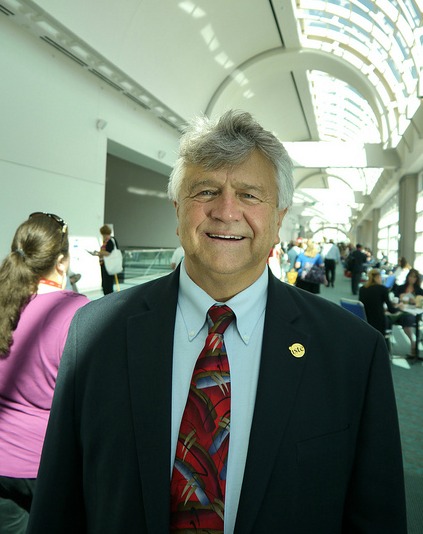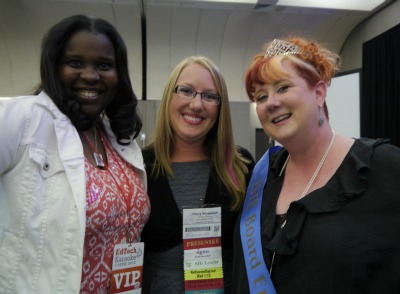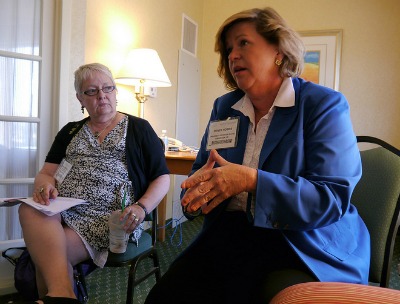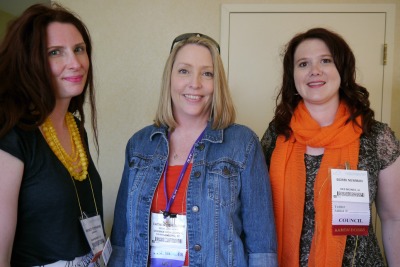Advocating on behalf of its members is a priority for ISTE (the International Society of Technology in Education). But in a rapidly changing landscape overshadowed by a continually contracting economy, even large organizations must retool their strategy.
In a press briefing at ISTE’s annual conference in San Diego, outgoing CEO Don Knezek and incoming ISTE CEO Brian Lewis discussed what’s ahead for the organization and specifically addressed library media specialists/school librarians, as well as the recent FCC proposal on digital literacy.
Shift in core competency

Don Knezek
Recounting ISTE’s evolution in his 10 years as CEO, Knezek identified a critical shift that’s happening in organizations across the board. “Ten years ago, we were the trusted source for information,” he says. But since then, ISTE’s seen a change in its core competency. “We found that the reason that most people belong [to ISTE] is because we put them in contact with people they’re interested in and doing front- line stuff and not so much for what we publish or our expertise.” That connecting of people “is now key to us,” says Knezek.
Library media specialists in ISTE
Librarians continue to be a strong, growing component of ISTE, according to Knezek. Three of ISTE’s 14 board members, Kathy Shrock, Gwyneth Jones, and Laurie Conzemius, are librarians. And media specialists are among the most dynamic constituents among ISTE’s virtual communities.
The kerfuffle over the FCC’s proposed “digital literacy corps,” which drew an angry response by school librarians, who questioned why support is not being directed instead toward media specialists who are already involved in this work, became a touchstone for addressing several issues during the news briefing.
“I’m so excited that the FCC believes in the importance of digital skills. It’s hard for me to criticize them for trying to bring it universally to our young learners,” says Knezek. “But those universal efforts are often less than satisfying.”

Joquetta Johnson, Tiffany Whitehead, Gwyneth Jones at ISTE's SIGMS Forum
As for the front-line educators’ role, Knezek reiterated the organization’s support, saying that library media specialists will maintain a place in ISTE’s advocacy platform. Moreover, he is “well aware” of school librarians’ concerns about representation of K–12 interests by ALA (the American Library Association).
ISTE, like ALA, is a large, umbrella organization representing various constituencies. Its members—from math teachers to tech coordinators—often carry secondary memberships in organizations at local and national levels. But even in a tight economy, with K-12 librarians also paying dues to ALA, ISTE has not seen a falloff in media specialist membership, according to Knezek.
ISTE’s special interest group for media specialists (SIGMS) has 4,256 current members, up from 3,558 in 2010, reports Colleen Kimball, special interest group liaison for ISTE.
Lisa Perez, a network library coordinator for the Chicago Public Schools and past chair of SIGMS, says she’s impressed with ISTE’s commitment to advocating for teachers and also for school librarians. Meanwhile, other media specialists attending ISTE appreciate the camaraderie and learning opportunities that come from rubbing elbows with fellow educators outside the library world.
A teamwork approach to advocacy
For ISTE going forward, the collaboration between organizations will be key, especially given fewer staff and resources. Referencing the FCC issue and the representation of media specialists at the national level, Lewis says aligning work and goals alongside other entities “is going to be more important than ever, but we need to think of those relationships in different ways.” Lewis, who most recently served as the Chief Strategy Officer and Interim CEO for the National Board for Professional Teaching Standards, will take over as Knezek formally steps down in September.

Brian Lewis
Given his past experience at the associational level, having also served as executive director of the California Association of School Business Officials, Lewis cited the territory issues that can arise when organizations collaborate. Turf also came up at a meeting on the digital literacy issue hosted by School Library Journal and held in Anaheim during ALA’s annual conference.
“There are a lot of stakeholders in digital literacy, not just libraries,” Renee Hobbs, director of the Harrington School of Communication and Media at the University of Rhode Island, told the attendees, which included Lynne Bradley and Emily Sheketoff of ALA, and librarians Bobbi Newman, Wendy Stephens, Sara Kelly Johns, Frances Jacobson Harris and Cathy Jo Nelson. “Don’t claim to own this,” advised Hobbs.
ALA has worked diligently on this front, having gotten language around digital literacy into the latest reauthorization of ESEA (Elementary and Secondary Education Act), according to Sheketoff, executive director of ALA’s Washington office. Most recently, the organization adopted a resolution supporting school libraries, devised by a special ALA presidential task force, formed in response to cuts to school library programs still ongoing.

Lynne Bradley and Renee Hobbs discussed digital literacy at ALA annual
ALA is also addressing the national Connect2Compete initiative, trying to find a way for libraries to be involved, says Sheketoff, adding that ALA president-elect Barbara Stripling is drafting a request for a meeting to address digital literacy instruction in schools.
Hobbs, who presented on digital literacy at ALA and ISTE, raised the red flag on troubling aspects of the public/private partnership of Connect2Compete. Dell and HP, for instance, will provide the program with reconditioning computers—outfitted with Web filters. This is just the thing that librarians should be calling the program out on, she says.
Making the case for school libraries on an individual level—or not
Wendy Stephens, a librarian at Buckhorn High School in New Market, AL, says digital literacy should be framed in terms of an ongoing learning process. It’s “an education for all of us, especially as technology is being developed.” Stephens sees opportunity in “what we can do as individuals, libraries providing critical access in rural areas. Creating personal stories of success around what libraries can do to enhance digital literacy in students—“that will be more persuasive to lawmakers,” she says.

Wendy Stephens, Cathy Jo Nelson, and Bobbi Newman
Stephens, along with other librarians at the meeting, raised the issue of those peers who aren’t on board with digital technology and the transition from print resources to electronic, much less related literacy skills. Cathy Jo Nelson, a library media specialist at Dorman High School in Roebuck, SC, seemed to sum up the sentiment in the room when she stated, “Get on board, get up to speed, or you are going to cost me my job.”


